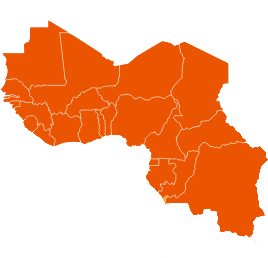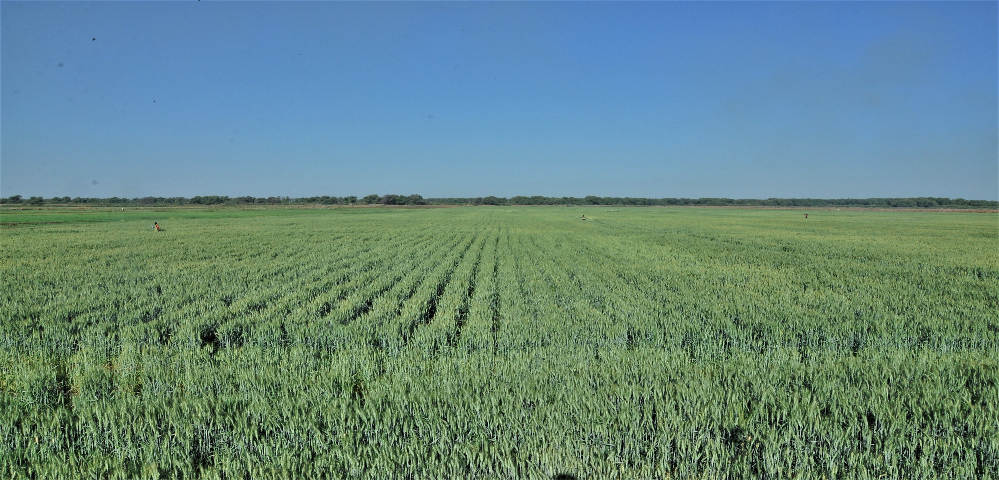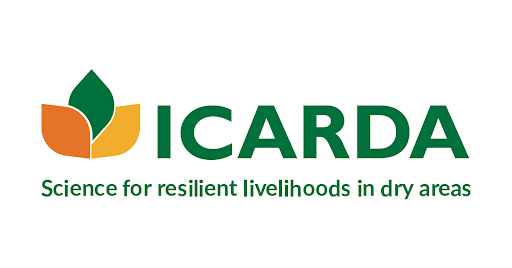Heat-tolerant wheat
“My increase in income from Technologies for African Agricultural Transformation project-supplied wheat allowed me to send my two children to Khartoum to study at a private university.”
Sudanese farmer Hachem Ahmas SalamBACKGROUND
The lack of timely access to sufficient quantities of affordable, quality seed is the main cause of the ever-widening gap between local wheat production and consumption. This gap creates a huge shortfall that is primarily met by imports. With help from governments and the private sector in terms of seed distribution, by using improved wheat varieties, countries are becoming increasingly self-sufficient and farmers have better access to food and markets.
WHAT’S INVOLVED
Heat tolerant wheat varities involve:
Farmer participation : During the research for development and testing of the heat-tolerant varieties, farmers made sure the crops could be successfully produced in the field.
Elite yield trials : Trials were carried out in three hub countries (Ethiopia, Sudan and Nigeria).
Innovation platforms (IP) : These are clusters where wheat-growing farmers, unions, millers, agricultural banks, policy makers, extensionists, scientists and other stakeholders come together to network and discuss processes across the value chain, from production to market.
EXPLORE THIS SOLUTION
High-yielding and heat-tolerant wheat varieties can offer:
- A sustainable way to tackle food security and increase self-sufficiency
- Strong international cooperation through innovation platforms

Countries involved
Sudan, Ethiopia, Nigeria
Project partners
Agricultural Research Center, Ethiopian Institute of Agricultural Research , Ethiopia; LCRI-Nigeria, CGIAR Reasearch Program WHEAT, Sudan Heat Platform, ISARD SC; Technologies for African Agricultural Transformation project, National Agricultural Research Extension Service
Project dates
2013 – 2019
Share this solution
Bookmark this solution
BookmarkShow Full Solution
Summary
The International Center for Agricultural Research in the Dry Areas (ICARDA) has developed high-yielding wheat varieties with resistance to extreme heat, drought, salinity, insect pests and diseases. The varieties have been adopted throughout Central and West Asia, North Africa and sub-Saharan Africa, areas highly vulnerable to climate change. This solution aims to enhance productivity, raise farmers’ incomes, create jobs and increase value addition by encouraging higher levels of wheat self-sufficiency.
Challenge/Problem
Wheat is an important commodity in sub-Saharan Africa for food security in terms of quantity and calories consumed. The production area of wheat is expanding beyond the region’s traditional wheat-growing areas. However, productivity is typically less than the global average because of heat, drought, salinity, soil acidity, rusts, insects and root diseases. Moreover, socio-economic constraints such as lack of access to input and output markets, poor rural infrastructure, low value addition and inconsistent government policy remain major challenges. All these factors are exacerbated by climate change and the degradation of natural resources.
Awareness of improved wheat varieties, as well as timely access to sufficient quantities of affordable, quality seed, remain low. Wheat consumption has been increasing because of growing populations, changing food preferences and an urbanization trend that has led to a growing ‘food gap’ in sub-Saharan Africa. The ever-widening gap between local production and consumption has created a shortfall that is primarily met by imports, draining the local economy. Despite the commercial opportunities in the wheat industry, the cereal remains the least of its kind to be produced locally.
Solution
In sub-Saharan Africa, high-yielding and heat-tolerant wheat varieties that resist rust diseases play a key role in increasing wheat production and achieving food security. As part of the African Development Bank-funded Technologies for African Agricultural Transformation (TAAT) project, ICARDA has worked with the national agricultural research systems (NARS) of Ethiopia, Sudan and Nigeria to deploy heat-tolerant wheat varieties along with complementary solutions. In addition to providing training and demonstrations, ICARDA also scaled out the wheat-based systems’ approach with a package of interventions: increasing production capacity, improving seed systems, supporting land preparation, and integrating practices for efficient irrigation and improved pest and crop management. The solution itself engaged farmers to test the heat-tolerant varieties, ensuring the crops’ viability in the field. Elite yield trials were implemented in three countries, and on-farm tests helped accelerate the release of the varieties to farmers. The solution was spread through innovation platforms, which include clusters of wheat-growing farmers, private and public seed producers, agri-input suppliers, extension services, NARS researchers, rural microfinance institutions, agricultural banks, policy makers and other stakeholders who come together to network, learn and discuss processes across the value chain.
Disseminating the solution required a favourable policy environment and commitments by national governments. The development of improved heat-tolerant and climate-resilient wheat varieties also included strong partnership with stakeholders. The CGIAR and national research centres developed the wheat varieties; the AfDB and national governments helped fund the research and extension activities; national governments and extension agents assisted in scaling out the innovations; and local banks gave credit to farmers, unions and seed growers.
Sudanese farmer Hachem Ahmas Salam has worked with wheat fields for over 20 years. “My increase in income from Technologies for African Agricultural Transformation project-supplied wheat allowed me to send my two children to Khartoum to study at a private university” he said
Results
The solution has rendered higher productivity and incomes for farmers while reducing dependence on costly food imports. Results include:
- Technology deployment: More than 30 high-yielding and heat-tolerant wheat varieties of ICARDA origin have been released since 2013.
- High yields: ICARDA wheat varieties are early maturing (90-100 days) and are characterized by high biomass, high yield potential even under heat stressed environments and good bread-making quality (14-15 per cent protein content). Average wheat productivity reached 3 tons/ha at the national level and 4.1 tons/ha at innovation platform sites.
- Accelerated seed multiplication and delivery: The innovation included partnerships with 58 public sector groups, private sector groups and seed producer cooperatives, producing over 145,000 tons of seeds that reached about 1.5 million farmers in target countries.
- Self-sufficiency: Sudan reached almost 50 per cent self-sufficiency in wheat production, with record wheat production in the 2019/20 cropping season.
- Empowerment: More women and youths were reached through the establishment of business centres that promote rural entrepreneurship. Access to credit facilities for inputs (seed, fertilizers and agrochemicals) for both smallholder and large-scale farmers was improved.
Lessons Learned/Potential for replication
All concerned stakeholders – including national agricultural research systems, public and private seed producers and suppliers, Ministries of Agriculture, development partners and commercial farms – need to be involved in the sustained maintenance of the innovation platforms for planning, producing and marketing wheat seeds. Thus, cross-border cooperation ensures that new improved varieties can be deployed across entire agro-ecological zones that span multiple countries. There is also a need for stable and enabling policies that enhance the competitiveness of domestic wheat production and encourage private sector involvement at all stages. The solution must continue to be funded; mechanization must be encouraged, especially in low-adoption areas; financial support from governments remains crucial; and environmental challenges like heat, drought, salinity, soil acidity, rusts, insects and root disease need to be overcome. Above all, the inclusion of women and youths, who in some cases make up 42 per cent of the beneficiaries, must be continued through farmers’ associations.
Next Steps
Policymakers are responding positively to initiatives regarding improved wheat varieties. The new varieties are a component of Sudan’s agricultural transformation strategy for wheat: the amount of land devoted to growing wheat will continue to increase over the coming years. Going forward, the aim is to increase African food production and thereby decrease food imports. For this, it is crucial to 1) deploy nutritious, high-yielding and climate-resilient wheat varieties and genetic stocks that resist diseases, heat and drought; 2) develop seed systems and advisory services; and 3) build national capacities through training, infrastructure and networking.
Last update: 25/05/2021



